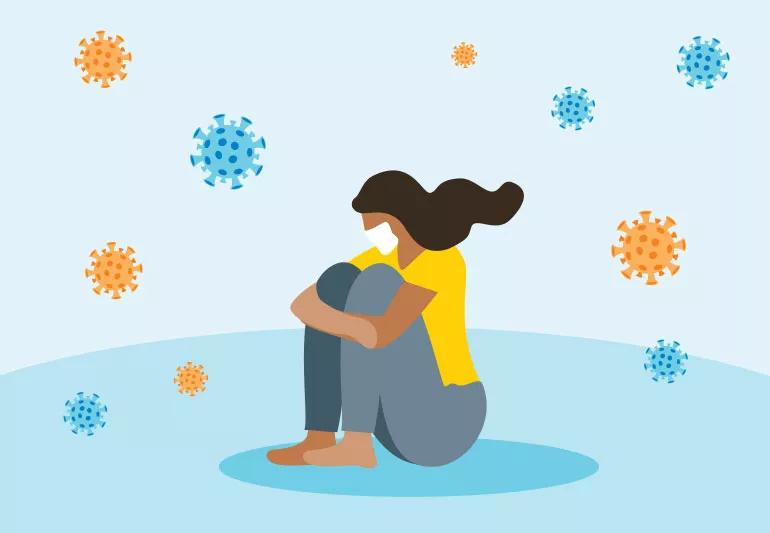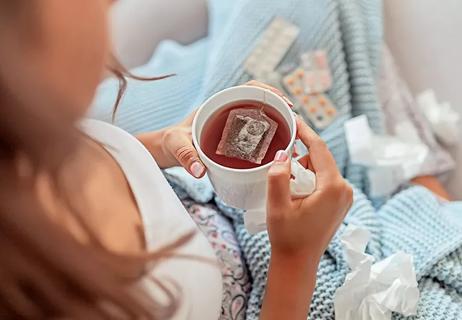Influenza puts stress on your body and can lead to serious conditions like pneumonia or stroke

Newer illnesses like COVID-19 may grab headlines, but old-and-familiar ailments such as influenza, or the flu, remain a serious health concern — a fact that many might learn during the upcoming flu season.
Advertisement
Cleveland Clinic is a non-profit academic medical center. Advertising on our site helps support our mission. We do not endorse non-Cleveland Clinic products or services. Policy
According to CDC estimates, tens of millions of Americans get the flu each year. Yet despite those numbers, the flu often gets talked about as if it’s little more than the sniffles. That’s a serious underestimation of the illness, cautions infectious disease specialist Kristin Englund, MD.
“The flu taxes your body in ways that the common cold doesn't", says Dr. Englund. "There’s a lot of stress put on your system as it works to fight off the infection — and that can lead to all sorts of complications.”
So, why is influenza sometimes mislabeled as a cold? Well, the viruses share symptoms such as a cough, fever and an overall cruddy feeling. But with the flu, symptoms often hit harder and last longer.
“Perfectly healthy people can get severe complications from influenza,” says Dr. Englund. “But if you have any underlying health issues, the risk becomes much greater.”
In severe cases, the flu can lead to:
Somewhere between 3% and 11% of the U.S. population — which represents millions upon millions of people — get infected with influenza every year, says the CDC. Most will recover within three to seven days, though some may see symptoms last a few weeks.
Advertisement
But your risk for developing severe flu complications increases if you have:
In addition, people at opposite ends of the age spectrum — those younger than 5 years old or older than 65 — tend to be more vulnerable when it comes to flu-related complications. Ditto for those who are pregnant.
Healthcare providers often encourage people to consider the flu vaccine as a way to lower their odds of serious illness.
“While no vaccine offers totally protection, research suggests that flu shots can reduce both the chances of infection and the severity if you do catch the virus,” explains Dr. Englund.
According to CDC estimates, flu vaccinations in the 2021–2022 season helped prevent more than a million medical visits and tens of thousands of hospitalizations. Other studies have found that people who were vaccinated had lower rates of ICU admissions and deaths from influenza.
For those who want extra protection — especially older adults, young children, or people managing chronic health conditions — the flu shot can be one useful tool alongside healthy habits like diet, exercise, and good hygiene.
(And to clear up a common misconception: the flu vaccine itself does not cause the flu.)
Want to keep the flu bug at bay this flu season? Aside from getting your flu shot, your overall health choices – diet, exercise, sleep and managing chronic conditions – play a huge role in how well your body can handle flu season. Consider these tips:
Despite best efforts, it’s still possible you may get the virus. Don’t ignore flu-like symptoms like fever, cough and body aches. Talk to a healthcare provider right away, especially if you’re in a high-risk group.
Advertisement
Quick action could allow you to benefit from antiviral medications, which can lessen flu symptoms and help you bounce back a little more quickly.
The bottom line? The flu deserves to be taken seriously.
“We see so many people in hospitals every year because of influenza,” emphasizes Dr. Englund. “People die from the virus every year, too. It’s not something to ignore, so take the precautions you can to stay healthy.”
Advertisement

Sign up for our Health Essentials emails for expert guidance on nutrition, fitness, sleep, skin care and more.
Learn more about our editorial process.
Advertisement

They can feel similar, but the differences matter — especially if you’re at higher risk for complications

From washing your hands and disinfecting surfaces to boosting your immune health, there are many ways to reduce your flu risk

The two main strains of the flu have a lot in common, but type A causes more cases and more severe illness than type B

Pasteurized milk is considered safe, but there are concerns about avian influenza spreading through raw, unpasteurized milk

The flu can make kids seriously sick, so watch for signs of dehydration and breathing problems

Tamiflu can shorten your child’s illness and even help prevent the flu

You may be spreading the flu virus before your symptoms start and up to a week after

While it typically starts in October, vaccine effectiveness can affect its duration and severity

Even small moments of time outdoors can help reduce stress, boost mood and restore a sense of calm

A correct prescription helps your eyes see clearly — but as natural changes occur, you may need stronger or different eyeglasses

Both are medical emergencies, but they are very distinct events with different causes